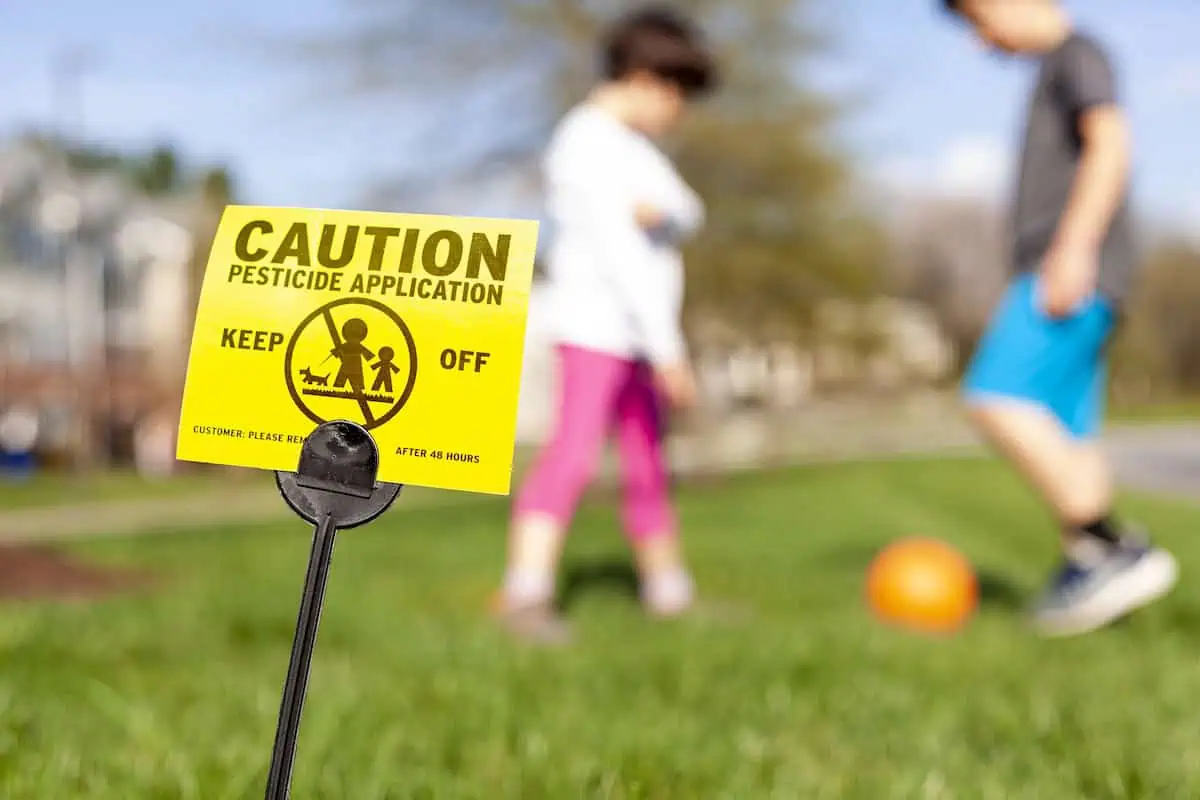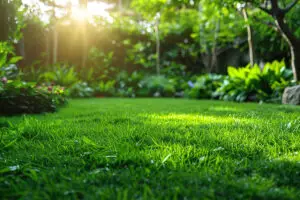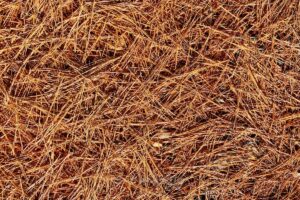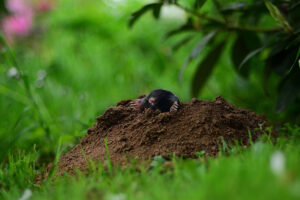This page may contain affiliate links. If you click and buy, we might get a small commission at no cost to you.
Lawn chemicals are substances used to maintain and improve the health and appearance of lawns. Some lawn chemicals like fertilizers or soil amendments aim to improve growth of the grass by providing essential nutrients or improving the soil. Other lawn chemicals often target appearance of the lawn, aiming to control typically unwanted things like weeds, fungus, grubs and other insects. The right cocktail of lawn chemicals can give you that soft green carpet of grass you are looking for, but they are not without downsides. In this article we’ll explore some of the main reasons why you may want to consider avoiding lawn chemicals and take a more natural approach.
7 Reasons to Avoid Lawn Chemicals
1. Health Risks
Lawn chemicals, especially pesticides and herbicides, can pose significant health risks to humans and pets. These substances contain toxic compounds that can cause acute poisoning if ingested, inhaled, or absorbed through the skin. Long-term exposure, even at low levels, has been linked to chronic health conditions such as respiratory issues, hormonal imbalances, and certain cancers.
For example, children and pets, who are more likely to come into direct contact with treated grass, are particularly vulnerable. Homeowners concerned about their family’s health might prefer safer, natural lawn care methods to avoid these potential risks.
2. Environmental Impact
The use of lawn chemicals can lead to significant environmental degradation. Runoff from treated lawns can carry chemicals into local waterways, contaminating lakes, rivers, and groundwater. This contamination can harm aquatic life, disrupt ecosystems, and affect the quality of drinking water.
Moreover, chemicals like nitrogen and phosphorus from fertilizers can cause algal blooms, which deplete oxygen in the water and kill fish and other marine organisms. Homeowners who are environmentally conscious may choose organic or sustainable lawn care practices to reduce their ecological footprint.
3. Soil Health
Repeated application of chemical fertilizers and pesticides can degrade soil health over time. These chemicals can kill beneficial microorganisms in the soil, disrupting the natural balance and leading to soil compaction and reduced fertility. Healthy soil is crucial for robust plant growth, as it supports nutrient uptake and water retention.
Over-reliance on chemical treatments can create a cycle of dependency where the lawn requires more chemicals to thrive, ultimately weakening the grass and making it more susceptible to diseases and pests. Homeowners interested in long-term soil health might opt for organic amendments and natural pest control methods.

4. Biodiversity Loss
Lawn chemicals can significantly impact local biodiversity. Insecticides and herbicides do not discriminate between harmful pests and beneficial insects, leading to a decline in pollinators like bees and butterflies. Further, insects, worms, and other invertebrates are crucial components of many birds’ diets. Pesticides can drastically reduce these populations, leading to a scarcity of food for birds.
Birds often build nests on or near the ground, in shrubs, trees, or other vegetation. Chemical treatments can contaminate these areas, posing risks to nesting birds and their chicks. Exposure to these chemicals can affect the birds’ reproductive success and the health of their offspring.
A diverse ecosystem is vital for maintaining natural pest control and pollination processes. By avoiding chemical treatments, homeowners can promote a more biodiverse and resilient landscape, supporting local wildlife and contributing to ecological balance.
5. Chemical Resistance
Pests and weeds can develop resistance to chemical treatments over time, rendering them less effective. This resistance often leads to the need for higher doses or more potent chemicals, escalating the environmental and health risks associated with their use. Additionally, resistant pests and weeds can become more challenging to manage, requiring alternative strategies that may be more labor-intensive and costly. Homeowners seeking sustainable lawn care solutions may prefer integrated pest management (IPM) techniques that combine cultural, mechanical, and biological controls to manage pests without fostering resistance.
6. Financial Cost
The ongoing expense of purchasing and applying lawn chemicals can add up, especially considering the need for repeated treatments throughout the growing season. Organic and natural lawn care alternatives, while sometimes requiring a higher initial investment, often prove more cost-effective in the long run. These methods, such as composting, mulching, and using native plants, can reduce the need for costly inputs and maintenance. Homeowners looking to minimize their lawn care budget might find that avoiding chemicals leads to greater savings and a more sustainable approach.
7. Personal Preference for Natural Solutions
Many homeowners prefer the aesthetic and philosophical appeal of a natural lawn. A chemical-free lawn can provide a safer, more enjoyable space for outdoor activities, particularly for families with children and pets. Additionally, cultivating a natural lawn aligns with values of sustainability and environmental stewardship, offering a sense of pride and satisfaction in contributing positively to the environment. Homeowners who prioritize natural beauty and environmental responsibility are likely to favor organic lawn care practices over chemical treatments.
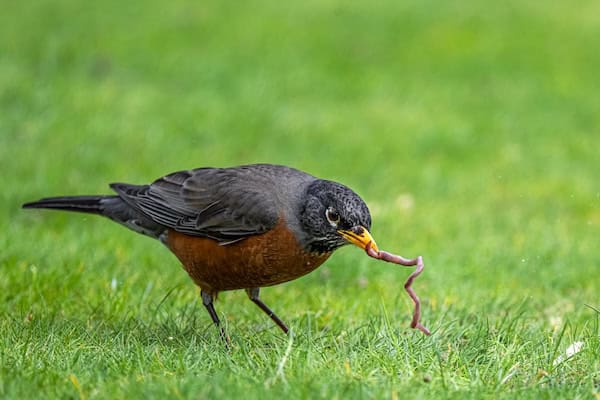
Alternatives to Lawn Chemicals
There are several organic and natural alternatives to lawn chemicals that homeowners can use to maintain a healthy, beautiful lawn while minimizing harm to the environment and wildlife. There are so many natural and organic methods to lawn care, it would be best to look up your specific concern to do a deep dive targeted to your needs. Here are just a few effective options that people can employ:
1. Organic Fertilizers
Organic fertilizers are made from natural materials like compost, manure, bone meal, and seaweed. These fertilizers release nutrients slowly, improving soil health and providing long-term benefits to grass. They also promote the growth of beneficial microorganisms in the soil.
2. Compost and Mulch
Composting yard waste and kitchen scraps creates rich organic matter that can be used to enhance soil quality. Applying a layer of mulch around plants helps retain moisture, regulate soil temperature, and suppress weeds, reducing the need for chemical inputs.
3. Integrated Pest Management (IPM)
IPM combines various strategies to manage pests effectively and sustainably. These methods include:
- Biological Control: Introducing natural predators or parasites to control pest populations.
- Cultural Practices: Maintaining proper lawn care techniques, such as mowing at the right height, aerating the soil, and overseeding to encourage healthy grass growth.
- Mechanical Controls: Using physical methods like hand-pulling weeds, using traps for insects, or applying barriers to prevent pests.

4. Proper Lawn Maintenance
Maintaining a healthy lawn through proper care practices can reduce the reliance on chemicals. Key practices include:
- Mowing: Mowing at the correct height (usually 3-4 inches) to encourage deep root growth and shade out weeds.
- Watering: Watering deeply and infrequently to promote strong root systems and drought resistance.
- Aeration: Aerating the soil to improve air and water movement, reduce compaction, and enhance nutrient uptake.
5. Companion Planting
Planting certain species together can naturally deter pests and promote healthy growth. For example, marigolds can repel nematodes, and clover can fix nitrogen in the soil, benefiting the grass.
6. Natural Pest Repellents
Using natural pest repellents like neem oil, garlic spray, or hot pepper spray can deter insects without harming beneficial organisms. These repellents can be applied to plants and soil to keep pests at bay.
